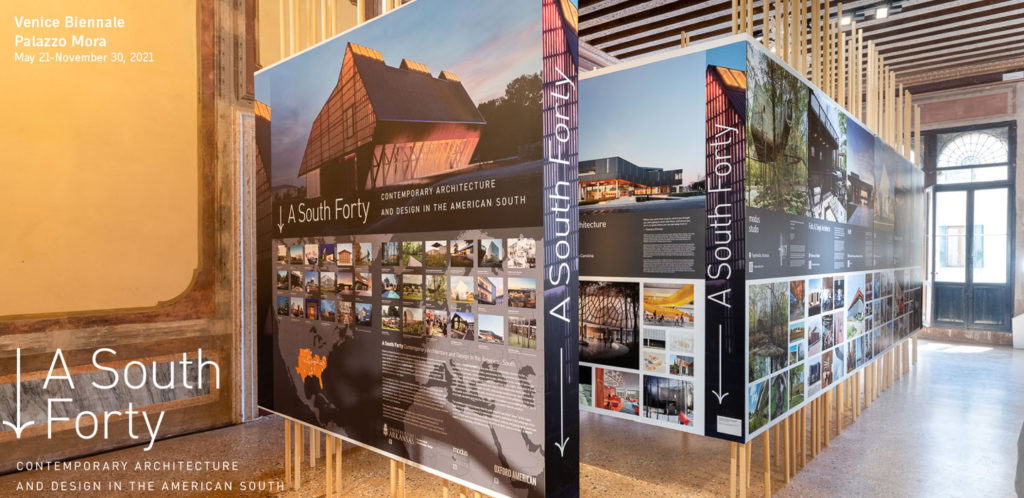News
May 2021
Thursday, June 3rd, 2021
We are honored to be a part of A South Forty, an exhibition to demonstrate the vitality of contemporary architecture and design in the American South through the work of multiple practices across the region.
The exhibition is on display at this year’s Venice Biennale, running from May 22-November 21 at the European Cultural Centre located in the Palazzo Mora in Venice.
Thanks to Peter MacKeith and Jonathan Boelkins at the University of Arkansas Fay Jones School of Architecture and Design, Modus Studio, and Oxford American for putting this together! Full press release below.

VENICE, ITALY – As part of the “TIME SPACE EXISTENCE” exhibition for the 2021 Venice Architecture
Biennale, The European Cultural Center will present A South Forty: Contemporary Architecture and Design
in the American South at Palazzo Mora. A South Forty is organized by the Fay Jones School of Architecture
and Design, University of Arkansas, together with modus studio of Fayetteville, Arkansas, and the Oxford
American Journal, and highlights the work of nearly forty practices. The exhibition is installed in the Great
Hall facing the canal and will be open from May 22nd through November 21st, 2021, with a press preview
on May 20th.
Exhibition Summary: The Fay Jones School of Architecture, University of Arkansas, working with modus studio
of Fayetteville, Arkansas, has worked to organize and curate an exhibition devoted to the vibrant, distinctive
contemporary architecture and design practices of the American South. The exhibition is aimed for installation
during the upcoming 2021 Venice Architecture Biennale, in a collateral venue, the Palazzo Mora of the
European Cultural Center.
In partnership with the highly regarded literary journal of the American South, The Oxford American, A SOUTH
FORTY will also be featured in the annual summer issue of the journal, one focused on the idea of “place” in
culture of the American South. The exhibition takes its cues from the critically successful and popularly
appealing annual Oxford-American issue highlighting the music of the American South and proposes that
architecture and design – the built environment – is as reflective and definitive of the culture and values of
society as the forms of music that animate that society.
Modern architectural history in the regional context of the American South is conventionally framed by
singular figures, from Paul Rudolph and the Saratoga School of Florida to Fay Jones and Bruce Goff in the
Ozarks and Oklahoma, or stereotypical typologies and appearances. In counterpoint, A SOUTH FORTY aims to
provide an overview of the current vitality of contemporary architecture and design in the American South,
through both illustrated profiles of buildings and practices, and statements of principles and observations by
those in practice in the region.
The contemporary “story” centers on the development of architecture and design in the American South
over the last generation (from 1990 forward) as the region undergoes rapid economic and population
growth, it stands and recovers from multiple natural disasters, and discovers a more complex and diverse
identity amidst the historical societal traditions and conventions. Such a mapping of the American South in
these terms open new and essential territories for work in architecture – more positive, empowering,
engaged, sensitive, and aware work altogether.
The mapping of A SOUTH FORTY geographically is organized along the armature of US Highway 40, running
west from the North Carolina Atlantic seacoast through the southeastern states to an inflection point in
Oklahoma. Approximately forty participating practices in the exhibition are drawn from the larger
southeastern region along this latitude.
The “story” of A SOUTH FORTY is also one of place-based design, attentive to the necessities of climate,
materials, labor, and purpose, but also attentive to overlooked or undervalued typologies, constituencies,
and locales. While there is the surge of new urban centers and suburban peripheries as conditions to
address in the region, there also is a new appreciation for the smaller communities and rural or even
wilderness landscapes as productive sites for distinctive work. As well, while design excellence has been
achieved by many practices at the residential scale, the greater emphasis in the exhibition is to be seen at
the public scale, in the civic realm, through the accomplishment of buildings and projects of strength,
durability and value for the communities in which they are situated.
The exhibition implicitly proposes that the path towards that better “place” of the region leads through
both recognition of a common inheritance embedded in the landscape of the American South, and a
reconciliation with that physical, cultural and phenomenal landscape. There is much work accomplished,
but much still to be done, and as a project, A SOUTH FORTY is just beginning, and still becoming.
A SOUTH FORTY: Contemporary Architecture and Design in the American South features the work of:
Alterstudio; Archimania; Architecturefirm; Dake Wells architecture; de Leon & Primmer Architecture
Workshop; DEMX architecture; Duvall Decker; Ecological Design Group; El Dorado / KSU Design + Make
Studio; emerymcclure architecture; Eskew Dumez Ripple; Evoke Studio Architecture; Frank Harmon
Architect; Fultz & Singh Architects; Helix Architecture + Design; Hobgood Architects; Ray Huff Architect;
Hufft; in situ studio; Katherine Hogan Architects; Marlon Blackwell Architects; modus studio; Office Jonathan
Tate; patterhn ives; Pendulum; Polk Stanley Wilcox; Rural Studio; Sanders Pace Architecture; silo ar+d;
Somewhere Studio; The Raleigh Architecture Company; Unabridged Architecture; University of Arkansas
Community Design Center; University of Arkansas Urban Design Build Studio; Vines Architecture; W.G. Clark
Architect